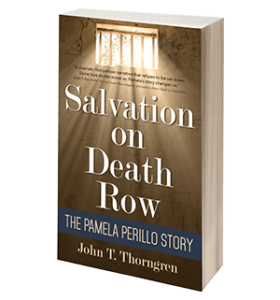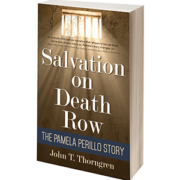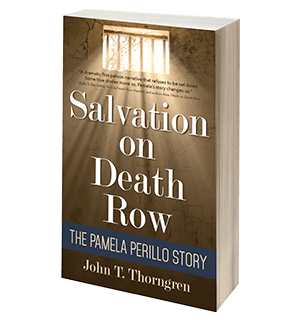Author Post: How 3 Heart Attacks and 2 ‘Cabbages’ Changed Me
 John T. Thorngren, author of Salvation on Death Row: The Pamela Perillo Story, has survived three heart attacks and two open-heart surgeries and has a more open, loving heart to show for it. Here’s how those experiences shaped John’s view of life.
John T. Thorngren, author of Salvation on Death Row: The Pamela Perillo Story, has survived three heart attacks and two open-heart surgeries and has a more open, loving heart to show for it. Here’s how those experiences shaped John’s view of life.
How Three MIs and Two ‘Cabbages’ Changed Me
I must assume that anyone who has had heart problems, especially open-heart surgery, becomes a changed person. Poems, literature, and even our speech reflect that the heart is the center of our being, both literally and figuratively. One does not undergo having his heart chopped on without questioning his mortality and the purpose as to why he is still alive. Oh yes, after any life-threatening surgery, especially open-heart, one notices that the sky is “bluer,” the birds sing louder, flowers are gorgeous—all of the above—and yet depression is often a side effect. Mortality is now a striking reality, and one wonders what to do in what little precious time that might remain.
As a survivor of three heart attacks and two open-heart surgeries, I know too well those mixed feelings of gratitude and terror, the sense of wanting to do more with my life but perhaps not being entirely sure where to begin. So like many before and many to come after, I began searching for my Creator and found redemption in Christ.
Life-altering Experiences
I had my first heart attack—or myocardial infarction (MI)—in 1980 at age thirty-nine and married with two children. Shortly after that, I had a coronary artery bypass graft, a CABG, otherwise referred to as a “cabbage.” In my case, it was a Cabbage X3—three grafts. Within ten years, I suffered two more heart attacks and then a Cabbage X4.
A cabbage is a brutal operation. You are cracked open like a crab being prepared for consumption. Veins are removed from your legs and grafted in to replace those pieces clogged with plaque. The life function of your heart and lungs are being performed by a machine. You are officially a dead robot. Has my life changed from those experiences? How could it not?
Every Life Is Precious
 The most notable change is a deep understanding that every life is precious and a special gift from God. I found this in my search for God while spinning the dial on my car radio. A televangelist, Dr. D. James Kennedy (deceased), was preaching on abortion, a devastation about which I felt indifferent. I listened. The passages he quoted from Jeremiah about knowing him before he was in the womb tweaked my spirit. A turning point. I knew instantly that life from conception is precious. And later by another divine series of events, I found life on Death Row equally as precious. This is the subject of the book, Salvation on Death Row: The Pamela Perillo Story, about Pamela’s redemption, her scheduled execution and her reprieve, and about the three other women with Pamela on Death Row for twenty-plus years, who also found salvation but were put to death by the State of Texas.
The most notable change is a deep understanding that every life is precious and a special gift from God. I found this in my search for God while spinning the dial on my car radio. A televangelist, Dr. D. James Kennedy (deceased), was preaching on abortion, a devastation about which I felt indifferent. I listened. The passages he quoted from Jeremiah about knowing him before he was in the womb tweaked my spirit. A turning point. I knew instantly that life from conception is precious. And later by another divine series of events, I found life on Death Row equally as precious. This is the subject of the book, Salvation on Death Row: The Pamela Perillo Story, about Pamela’s redemption, her scheduled execution and her reprieve, and about the three other women with Pamela on Death Row for twenty-plus years, who also found salvation but were put to death by the State of Texas.
No entity, no state, no government, no kingdom, no person should ever take the life of a prisoner in revenge. Even after the first homicide recorded in Scripture, the killing of Abel by Cain, God did not inflict the ultimate punishment on Cain. Although Scripture gives the state the right to execute, it does not give us (those whom the state represents) a mandate. How can we call ourselves Christians and have no compassion, no mercy, and no realization for the sanctity of life?
‘A Lamp to Those Searching’
Does it take a sickness, a calamity, a fall to the bottom—such as what Pamela and her three fellow Death Row inmates experienced—to realize our purpose on earth, to comprehend the meaning of our life as well as that of others? No. I have seen others come to redemption through a simple curious nature, to find out what will fill that spiritual hole that we all have.
Pamela and I hope this book is a lamp to those searching, to those bound in drugs, and to those who are indifferent about the death penalty.
John Thorngren, a Texas writer and graduate of the University of Texas, has enjoyed a myriad of life experiences, working everywhere from basements to boardrooms. He is a songwriter published in Southern Gospel and an author of several patents, technical articles, and a nonfiction book on probability and statistics, in addition to Salvation on Death Row. John and his wife of more than five decades live in Shady Shores, Texas, on Lake Lewisville, where their livestock freely roam the grounds.


 Did you ever find yourself surprised or challenged by what you learned as you wrote the book?
Did you ever find yourself surprised or challenged by what you learned as you wrote the book?
